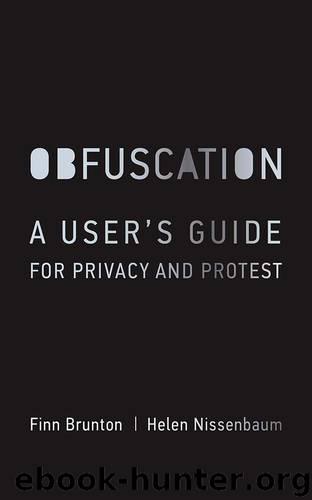Obfuscation by Finn Brunton

Author:Finn Brunton [Brunton, Finn]
Language: eng
Format: epub
ISBN: 9780262029735
Publisher: The MIT Press
Published: 2015-07-17T16:00:00+00:00
4
Is Obfuscation Justified?
Be fire with fire; Threaten the threatener and outface the brow.
Shakespeare, King John, 1595
After a lecture on TrackMeNot,1 a member of the audience rose to say that she was deeply troubled by the valorization of deceit and dishonesty. To her it didn’t seem right to submit search queries that were not of true interest. The question of deception has not been the sole source of opposition to obfuscation; other sources of opposition include wastefulness, free riding, database pollution, and violation of terms of service.
Challenges such as that made by the woman at the lecture were worrisome to us: ours was supposed to be the moral high ground, with TrackMeNot defending individuals against illegitimate and exploitative information practices. But such challenges could not be summarily brushed aside. Because obfuscating tactics are often fundamentally adversarial, involving dissimulation and misdirection, the appropriation of resources for unintended or undesired uses must be explained and justified. In an article titled “A Tack in the Shoe,” Gary Marx writes: “Criteria are needed which would permit us to speak of ‘good’ and ‘bad,’ or appropriate and inappropriate efforts to neutralize the collection of personal data.”2 To use obfuscation because it works, or even because it is the only approach that works, isn’t enough. Obfuscation, if used, must be defensible on ethical grounds, and must be compatible with the political values of the society in which one lives.
TrackMeNot exposed many of the ethical issues that can confront not only developers of obfuscating systems but also users, and as a consequence exposed a need to distinguish uses that are morally defensible from uses that are not. Intuition places the Craigslist robber, with his unwilling identically dressed confederates, among the latter, and the Allies’ radar chaff among the former, but why? What makes them different? And how might we adapt the answer to more ambiguous cases? Mere approval or disapproval isn’t sufficient if we are to defend the legitimacy of a particular system; instead, we must provide systematic reasons why that system avoids moral and political hazards.
This chapter prepares designers or users of obfuscation to meet a range of challenges they are likely to confront. Some of the challenges are ethical, claiming that obfuscation causes harm or violates ethical rights beyond general harms. Other challenges are political, suggesting that obfuscation abridges political rights and values, that it is unfair or unjust, that it redistributes power in illegitimate ways, or that it is generally at odds with the political values of surrounding societies or communities.
Download
This site does not store any files on its server. We only index and link to content provided by other sites. Please contact the content providers to delete copyright contents if any and email us, we'll remove relevant links or contents immediately.
The Secret History by Donna Tartt(19088)
The Social Justice Warrior Handbook by Lisa De Pasquale(12190)
Thirteen Reasons Why by Jay Asher(8910)
This Is How You Lose Her by Junot Diaz(6887)
Weapons of Math Destruction by Cathy O'Neil(6280)
Zero to One by Peter Thiel(5802)
Beartown by Fredrik Backman(5754)
The Myth of the Strong Leader by Archie Brown(5507)
The Fire Next Time by James Baldwin(5445)
How Democracies Die by Steven Levitsky & Daniel Ziblatt(5218)
Promise Me, Dad by Joe Biden(5153)
Stone's Rules by Roger Stone(5088)
A Higher Loyalty: Truth, Lies, and Leadership by James Comey(4964)
100 Deadly Skills by Clint Emerson(4925)
Rise and Kill First by Ronen Bergman(4789)
Secrecy World by Jake Bernstein(4753)
The David Icke Guide to the Global Conspiracy (and how to end it) by David Icke(4719)
The Farm by Tom Rob Smith(4511)
The Doomsday Machine by Daniel Ellsberg(4490)
